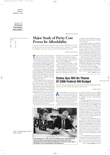Though 90 percent of people with depression responding to a recent online survey believe it is important to take their antidepressant medications exactly as prescribed, at some point 40 percent said they stopped taking these medications without a doctor's consent because they believed they were no longer experiencing depression symptoms.
In addition, only about half of those who were being treated for depression (53 percent) considered themselves “well informed” about their disorder and the medications used to treat it.
These are some of the findings released in August from a survey sponsored by the National Alliance for the Mentally Ill (NAMI) and funded by Wyeth Pharmaceuticals.
The survey was conducted online by Harris Interactive Inc. in April. A password-protected e-mail link to the survey was sent to 1,086 people who had acknowledged in an earlier Harris survey that they had been diagnosed with depression and were taking antidepressants.
The survey participants had voluntarily signed up to be part of Harris Interactive's multimillion-member database and were screened to ensure that they were at least 25 years old, had been diagnosed with depression, were taking a prescription antidepressant at the time of the survey, and had not taken a depression-related survey in the prior six months.
In an press release announcing the findings, NAMI Medical Director Ken Duck-worth, M.D., pointed out that “the majority of people with depression can achieve success with medication, talk therapy, or a combination of both.” He also stated that physicians “must select appropriate therapies and provide the education and support necessary to help patients understand their illness and achieve success.”
Survey respondents answered questions about their treatment regimen, knowledge about depression and its treatment, quality of life, and response to treatment.
These were among other findings from the survey:
•
Only about 25 percent of respondents were receiving “talk therapy” or counseling as part of their treatment regimen.
•
Only 22 percent of respondents said that they had ever been told by their physician that their treatment could eventually eliminate most or all of their depression symptoms.
•
Less than 25 percent of respondents were aware of the differences between full and partial response to depression medication.
•
Only 34 percent of respondents discussed their risk of relapse with their physician. ▪
